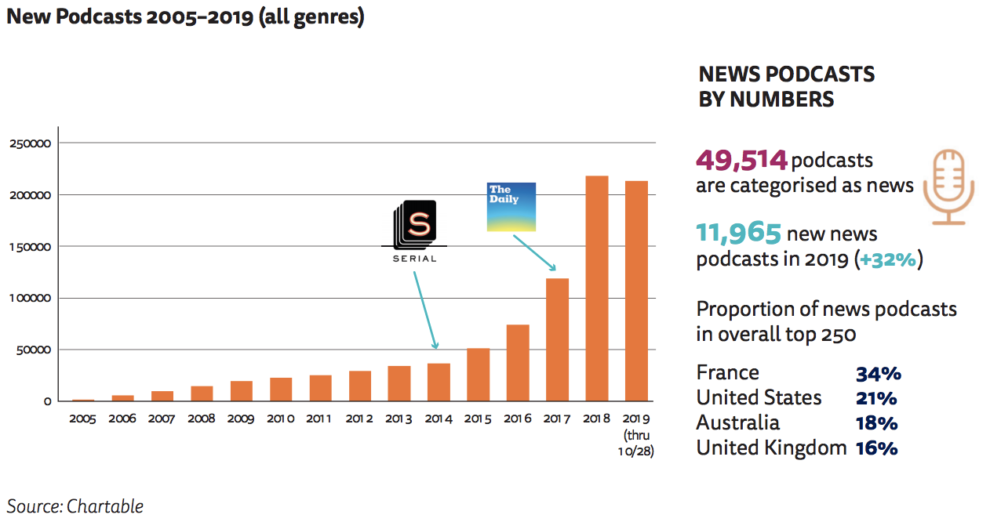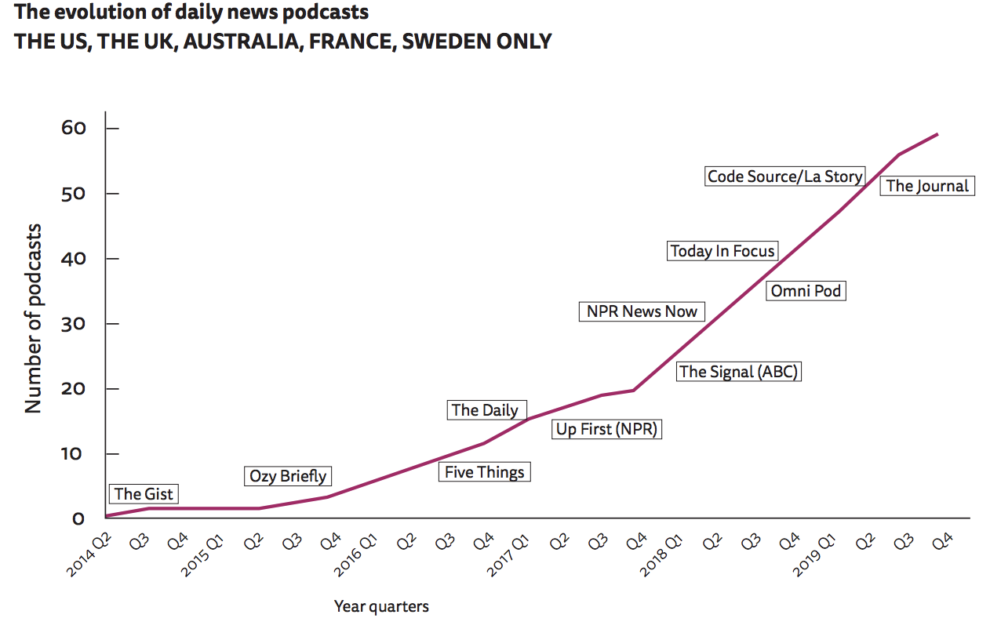Blog
News Podcasts and the Opportunities for Publishers
There’s no better way to wrap up our “Business of Audio” series for 2019 than digging into the latest report from Retuers on news podcasts and the opportunities for publishers. This report looks at the 15 year old phenomenon that is suddenly a ‘hot topic’ in the publishing industry, addressing two areas that we think have been lacking in previous research: monetisation options beyond advertising and podcasts in non-Anglophone countries.
News audio punching above its weight
This research found that while news podcasts make up a small proportion (6%) of overall podcasts, they are heavily consumed. Of the most popular podcast episodes on the Apple charts (the industry standard for measurement), around a fifth were from news podcasts (21%).

News podcasts themselves are also rapidly growing, with an increase of about a third this year alone: an additional 12k news podcasts were added globally between January to October 2019. These news podcasts fall into three main categories:
- Micro-bulletins: short news updates that provide a quick summary of the day’s news (1-5 minutes)
- News round-ups: longer podcasts to brief listeners at particular points during the day (6-15 minutes)
- Deep dives: focus on one news story for a deeper analysis (20+ minutes)
In the US and the UK, deep dives have been the biggest hit with consumers, with The Daily from The New York Times leading the pack. Outside of these two countries though, deep dives haven’t necessarily taken off as much. For example in Sweden it is news round-ups that perform best, with Ekot from Sveriges Radio and Omni Pod from Schibsted standing out.

Daily news podcasts are a relatively recent development outside of Anglophone countries, however they’ve managed to find audiences quickly. La Story from Les Echos has attracted 100,000 weekly listens, more than double the figure when they launched in May of this year.
Opportunity or threat for habit formation?
With publishers focusing more and more on habit formation in the coming year, audio is of growing interest for many publishers. Daily news podcasts are particularly well-suited for habit development due to their frequency of publication. Furthermore, podcasts are often an additional way someone consumes news, rather than being a replacement of an existing news habit. Their screenless nature means podcasts are perfect for adding into moments that were previously devoid of news consumption, such as while driving or doing chores. In Sweden, Schibsted’s Omni Pod originally started as an experiment but due to its perfect alignment with the typical news consumer’s morning routine, the podcast has stuck around.
That’s why many publishers are seeing deeper engagement with their daily news podcasts: in this report, data from private publishers show that listeners come back several times a week and listen to the majority of each show – completion rates tend to be between 60% and 90%. This means users are engaging on average for more than an hour per podcast per week, which is a huge jump from a few minutes a week for the average website visitor.
We are thrilled to have 25 minutes a day with people that we didn’t have before. We really think of The Daily as the new front page.
Erik Borenstein, Director of Audio at The New York Times
In less than one year, The Guardian has built a larger audience for its daily podcast than one that buys their newspaper. This audience is also younger than the print readers, and even younger than website readers, so it has helped to open up a new audience to The Guardian, rather than cannibalising existing readers. Still, some publishers do worry about the cannibalisation fear, including The Times and The Sunday Times in London.
You can see consumer habits changing to include audio more in daily routines. It feels like a positive opportunity but also it’s a threat for attention – so it’s a place that we have to be.
Chris Duncan, Managing Director of The Times and Sunday Times
Revenue growing….at least in Anglophone countries
In the US especially, publishers are already deriving significant revenue from podcasts, with more than half of online magazine Slate’s total revenue coming from podcasts now and National Public Radio (NPR) expected to earn $55m from podcasting next year, overtaking radio in terms of sponsorship income. Advertisement is still the main revenue driver, even for publishers that otherwise employ a subscription model. This is partly because podcast ads are so profitable for publishers, as they are mostly considered ‘brand safe’ and audio ads are relatively hard to skip. Still, there’s a growing concern about host-read ads which are popular on non-news podcasts. Due to concerns about trust, such host-read ads are not considered to be appropriate for news podcasts.
However outside of the Anglosphere, monetisation remains a challenge, especially in smaller markets. On one hand this could be because podcasting in these countries is just beginning to catch up to the Anglosphere. For example, in France the majority of trending podcasts are ‘catchup radio programmes’, which the report defines as “time-shifted, on-demand programmes formerly broadcast on radio”. That means there’s still been a relative lack of investment from non-broadcast publishers in France. That can be explained by the significant investment daily news podcasts require. The New York Times has 15 dedicated people working on The Daily, as part of a wider audio team of 30. Of course, it also has access to a total journalistic team of hundreds. In France however, two of the most popular news podcasts from Le Parisien and Les Echos are produced with teams of just four or five. These teams did look at The Daily when trying to create first-mover advantage in the French news podcasts industry, using a similar format of looking at one big story per episode. Le Parisien even cancelled its audio briefing on Amazon Alexa in order to make room for their deep-dive podcast.
This lack of revenue growth can also be explained by the smaller market size in certain countries, such as Denmark which has a population of less than 6 million — there are fewer Danish speakers worldwide than people living in New York City! That’s one reason why Politiken’s daily podcast has begun experimenting with a hybrid model where the podcast is free for two days each week, while the mid-week versions are kept just for subscribers. Zetland also doubts that podcast advertising will ever work in their small market, so instead they are focusing solely on subscriber-based audio. After an audience survey of its 13,000 members, they decided to make an audio version available for all their articles. They’ve also ramped up their podcast operations, adding a daily news podcast in the afternoon.
Just as it is with digital subscriptions, we expect to see innovations in audio subscriptions coming out of Europe more so than the US. In the past year and a half, we have seen a range of premium audio services launch. Majelan is one that aims to be the leading audio app for French-speakers, while Sybel is another new French provider. Sybel now has hundreds of thousands of active users so the focus becomes how to convert them into paying subscribers. In Denmark, Podimo is a new start-up that aims to help with audio discovery, with publishers getting between 20-50% of revenue from the ad-free experience, depending on the level of exclusivity.
Audio will continue to be an important topic for publishers finding a sustainable business model in 2020, so make sure to check back as we provide new insights and analysis throughout the year.
This article was written by Mary-Katharine Phillips, Media Innovation Analyst at Twipe from 2017 – 2021.
Other Blog Posts

Stay on top of the game
Subscribe to Twipe’s weekly newsletter to receive industry insights, case studies, and event invitations.
"(Required)" indicates required fields

